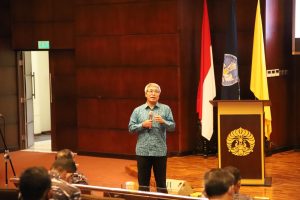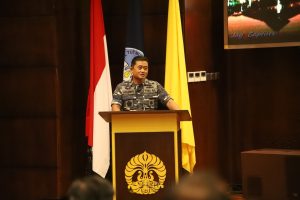
Indonesia has repeatedly emphasized that it has no dispute with China in the North Natuna Sea, but the activities of a number of Chinese fishing vessels and patrols in the Indonesian EEZ around Natuna are a matter of concern. According to Edy Prasetyono, Ph.D., the geographical location of the Indonesian territory in the North Natuna Sea waters makes Indonesia one of the battlefields of influence and strategic wars of the United States and China.
The lecturer of the International Relations Study Program at the Faculty of Social and Political Sciences (FSPS) of the Universitas Indonesia (UI) conveyed this in front of dozens of Seskoal lecturers who conducted a comparative study at FSPS UI on (20/01). In addition to an introduction to FSPS UI, the teaching-learning process and the academic system, the comparative study was filled with public lectures on the North Natuna Sea Conflict in terms of politics, diplomacy, economics and law at the UI Council Hall, Depok Campus. The event was then followed by a discussion between First Admiral Judijanto, S.T, M.Si, M.A., from Seskoal and Edy Prasetyono from FSPS UI.

Edy explained that the United States realizes Indonesia’s strategic position. “China has high confidence and the perception of the United States is in decline. The United States has a view that China is a strategic competitor that threatens the position of the United States,” Edy said.
He said that the strategy of the United States is to have bilateral and multilateral alliances with large countries and military heavy conceptions. Meanwhile, China emphasizes the pragmatism of economic relations, cooperation in infrastructure development, political support and military strengthening in the North Natuna Sea.

First Admiral TNI Judijanto explained that in January 2020 dozens of Chinese fishing boats escorted by coast guard ships and Chinese government frigates, broke into the Indonesian EEZ area in the waters of the North Natuna Sea. In addition, the conflict-prone situation in the North Natuna Sea has escalated to a crisis point because countries in the region that oppose China’s unilateral claims will compete to increase their military defense forces.
“China’s dominance over the North Natuna Sea area can help China do one or more things, such as controlling fishing operations and oil and gas exploration activities in the North Natuna Sea and coercing, intimidating, or providing political pressure to other countries bordering the North Natuna Sea,” said Judijanto.
Judijanto further explained, there are several facts that still occur in North Natuna waters, including the unresolved conflict related to the EEZ and the continental shelf, fishing activities, and China protesting Indonesia’s oil and gas exploration activities.
In the North Natuna Sea conflict, these claims overlap with the territorial waters and EEZs of a number of ASEAN countries such as the Philippines, Vietnam, Malaysia and Brunei Darussalam. Meanwhile, the United States has become a country that actively opposes China’s unilateral claims and actions.
Author: Arie Adhitya | Editor: Maudisha AR



